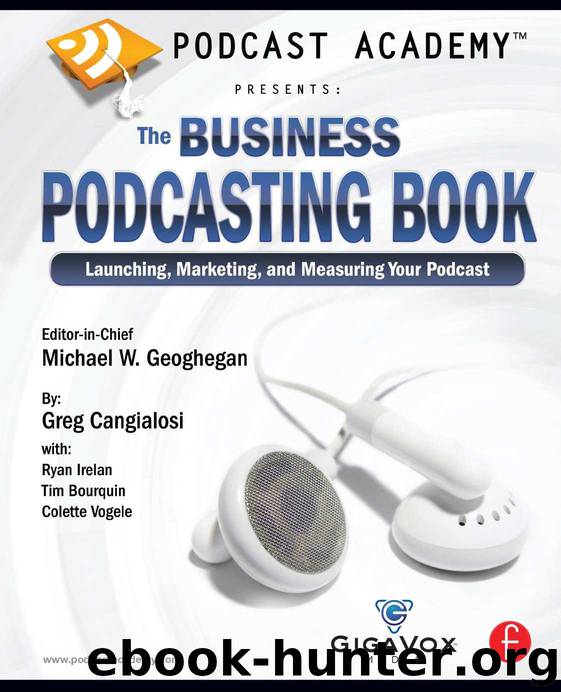Podcast Academy: The Business Podcasting Book: Launching, Marketing, and Measuring Your Podcast by Michael W. Geoghegan & Greg Cangialosi & Ryan Irelan & Tim Bourquin & Colette Vogele

Author:Michael W. Geoghegan & Greg Cangialosi & Ryan Irelan & Tim Bourquin & Colette Vogele
Language: eng
Format: mobi
Publisher: Taylor and Francis
Published: 2014-08-06T16:00:00+00:00
It should be noted that these licenses stem from “traditional” practices in a pre-podcasting and pre-Internet world. As such, they typically pertain to movie releases and television broadcasting, and their specific application to the digital on-line world is not obvious. Because of that, use of standard forms should be tailored carefully for the podcasting situation.
SYNC LICENSE The sync license is negotiated with the copyright owner (likely the music publisher) directly. Traditionally, the sync license allows you to “synchronize” a musical work with an audiovisual work, such as a motion picture or television program, and to make copies of the resulting audiovisual work. Also traditionally, these licenses come in only two flavors: a theatrical sync license and a television sync license. This means that under a traditional sync license, a podcaster may only distribute the licensed copies for the specific purpose of either exhibiting the audiovisual work in motion picture theaters or broadcasting the work on television. It is not clear how exactly these sorts of licenses will be applied in the podcasting context, but by analogy, the podcaster may propose that a sync license specifically permitting the podcaster to exhibit the audiovisual work in a podcast (expressly clearing the fact that that distribution is online and via RSS (really simple syndication)) be created to clear those rights directly with the music publisher.
MASTER USE LICENSE The master use license is negotiated with the record company. It applies only if the podcaster wants to use a particular recording of a musical work with a video image that will be heard in a video podcast. Permission for this license must be obtained from the record company to use the “master recording” of the song for inclusion in the video podcast.
VIDEOGRAM LICENSE Traditionally, a videogram (which is shorthand for “video” + “program”) license is used to describe a license for programs contained in audiovisual devices—like videotapes, laser discs, or DVDs—primarily intended for sale to the public for in-home use. Whether a podcast is legally considered the same as a videotape, laser disc, or DVD remains unclear and, as noted previously in this Chapter, whether the distribution right of a copyright owner is implicated by disseminating content over the internet is a question open for debate. Nevertheless, assuming for the sake of argument that the podcast is considered the same as one of these forms of distribution, a separate “videogram” license from the music publisher and the record company would be required if the podcaster plans to distribute the podcast to the public (which, of course, is how most podcasts are distributed). The videogram license may be necessary because the music publisher's permission under the traditional sync license may not extend to copies of the podcast that are distributed to the public in forms not included in the sync license. Likewise, the record company's permission under the master use license to use the recording of a song in the podcast may not authorize releasing the podcast for distribution to the public. The important notion here
Download
This site does not store any files on its server. We only index and link to content provided by other sites. Please contact the content providers to delete copyright contents if any and email us, we'll remove relevant links or contents immediately.
Nudge - Improving Decisions about Health, Wealth, and Happiness by Thaler Sunstein(7690)
Deep Work by Cal Newport(7063)
Principles: Life and Work by Ray Dalio(6421)
The Doodle Revolution by Sunni Brown(4753)
Factfulness: Ten Reasons We're Wrong About the World – and Why Things Are Better Than You Think by Hans Rosling(4731)
Eat That Frog! by Brian Tracy(4525)
Thinking in Bets by Annie Duke(4218)
Hyperfocus by Chris Bailey(4111)
Visual Intelligence by Amy E. Herman(3775)
Writing Your Dissertation in Fifteen Minutes a Day by Joan Bolker(3723)
Ogilvy on Advertising by David Ogilvy(3604)
Hidden Persuasion: 33 psychological influence techniques in advertising by Marc Andrews & Matthijs van Leeuwen & Rick van Baaren(3552)
How to Win Friends and Influence People in the Digital Age by Dale Carnegie & Associates(3547)
How to win friends and influence people by Dale Carnegie(3470)
The Pixar Touch by David A. Price(3431)
Schaum's Quick Guide to Writing Great Short Stories by Margaret Lucke(3373)
Deep Work: Rules for Focused Success in a Distracted World by Cal Newport(3225)
Work Clean by Dan Charnas(3115)
The Slow Fix: Solve Problems, Work Smarter, and Live Better In a World Addicted to Speed by Carl Honore(3006)
